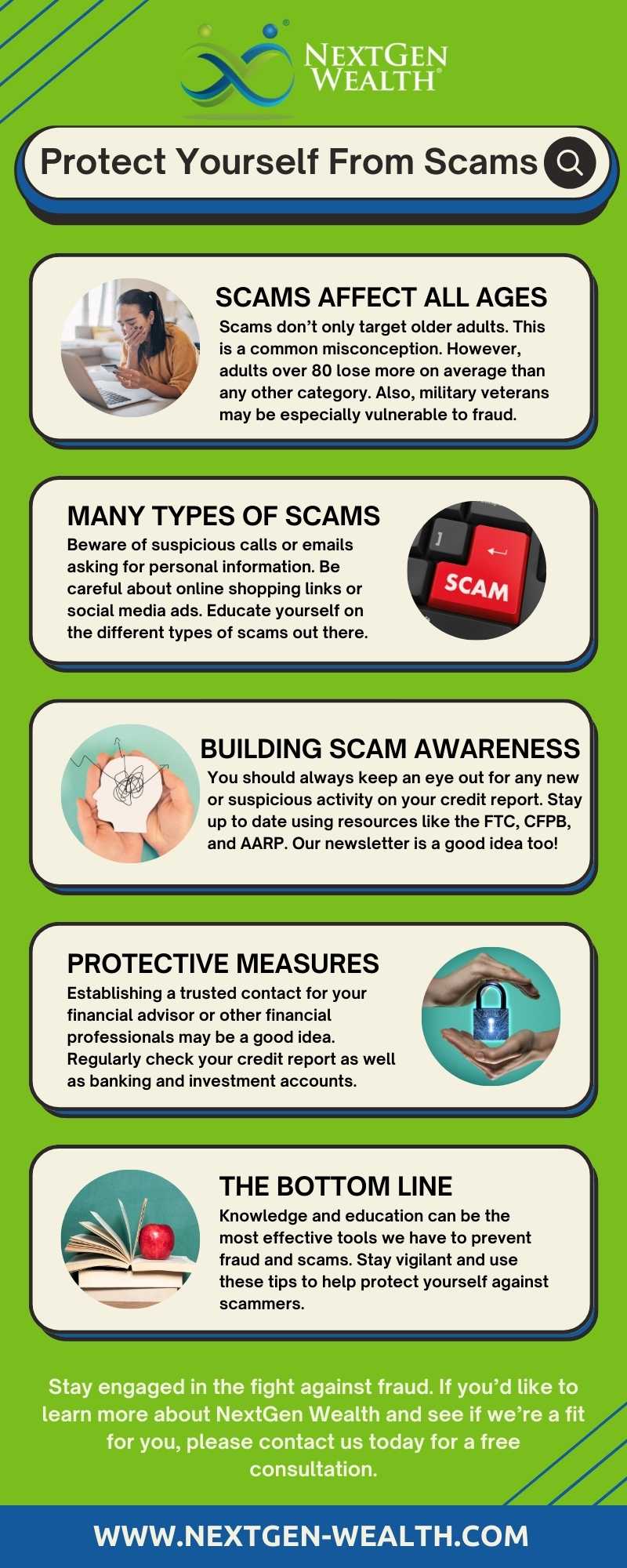Tips on Avoiding Scams from AARP

Fraud and online scams are a growing threat to all Americans. However, you can take steps to make yourself less likely to become a victim of scammers. In 2023, the Federal Trade Commission received reports of over $10 Billion in total fraud losses!
Brandon Lovingier was privileged to interview Kathy Stokes, the Director of Fraud Prevention Programs with AARP, at FinCon 2023. Her insights on fraud prevention are used throughout this article, along with some of our own advice and helpful tips. We hope to inform you of best practices to protect you and your loved ones from becoming victims of fraud, theft, and scams.
Table of Contents
Understanding the Scope of Scams
Becoming a victim of a scam isn’t just for “someone else” or the elderly. Scammers and identity thieves target anyone and everyone without regard to age. In today’s world, you must be vigilant.
Scams Affect All Ages
Scams don’t only target older adults. This is a common misconception, which Kathy was quick to point out. Here’s what she had to say:
“Younger people lose money more often to fraud. There’s this sort of wide assumption that it really only happens to people who are older, and it has to do with cognitive decline. And that’s really not the case. What is the case is that when that older adult is the target, and they’re victimized, they lose so much more.”
According to the latest FTC data for 2023, those aged 59 and younger reported nearly 732,000 instances of fraud versus just over 392,000 cases of fraud for those 60 and older. However, adults over 80 lost more on average than any other category.
Clearly, fraud is widespread across all age groups. However, as you enter retirement, your ability to recover from those losses might not be as easy. A 30-year-old has the majority of their working career ahead of them to recover.
Veterans May Be at Higher Risk for Scams
Kathy also mentioned veterans, who make up nearly 7% of the US adult population, are especially vulnerable to fraud. She said some of AARP’s research shows, “Veterans lose money to fraud 40% more than the general population because they are explicitly targeted.”
If you or someone you know is a veteran, be especially careful. You’re never required to pay a fee to receive veteran’s benefits. The Department of Veterans Affairs (VA) has additional tips and tools to avoid fraud on its website.
Types of Scams and How to Avoid Them
Scammers are as creative as they are annoying. There are several different types of scams you should be aware of. Some of the top scams in 2024 include Artificial Intelligence (AI)-powered scams, Student Loan Forgiveness scams, and Phone scams.
The rise of artificial intelligence (AI) tools has made it even easier for scammers to create emails, texts, or even phone calls, which can be very convincing. This means we must be even more alert and aware of potential scams. There are many different scams out there, but we’ll touch on a couple of the more prevalent ones.
Phone Scams
Many phone scams rely on fear to get you to take action. They may often impersonate a company you do business with, like a bank or insurance company. These types of scams almost always make you feel you must act immediately, or else you’ll be fined, lose a service, or something else bad will happen.
As a general practice, companies will not contact you out of the blue and ask for account numbers or other information. Even if you feel the call is legitimate, it’s okay to hang up and call the customer service number on the back of your card or statement. Never give out your personal information to someone you don’t know.
These scammers may even try to impersonate a relative or charity organization to ask for help. They’ll attempt to leverage your kind heart to trick you into giving them money. Be aware, they can be very convincing and even hire people or use AI to impersonate a relative.
Online Purchases
There are many online scams, but online shopping scams are rising. If the deal seems too good to be true, it is. Be very careful of spoofing websites made to look like legitimate websites.
Sometimes you may actually receive the product, but later find out it was stolen merchandise resold to you. Other times, you may receive something completely different than what you ordered or never receive anything at all.
Be sure to shop from reputable sources and be cautious or avoid buying through shopping links on social media. Scammers will often pay for social media ads to reach as many people as possible before they’re found out and shut down.

Building Awareness Around Scams and Fraud
It is especially important for consumers to educate themselves on the newest scam trends. There are several ways to do this, including protecting yourself from fraud.
Check Your Credit Report
You should always check your credit report for new or suspicious activity. You can obtain a free copy of your credit report through the federally mandated-AnnualCreditReport.com website.
Many credit card companies and banks will also offer to give you your credit report and credit score for free. Be aware of other knock-off websites that may imitate AnnualCreditReport.com in an attempt to obtain your information.
Education Resources
There are many resources available to help you learn about and prevent fraud. If you’re a data nerd like us, you might really enjoy the FTC Tableau for tracking scam data. Kathy Stokes also mentioned some of their resources: “At AARP, we have the Fraud Watch Network. We have watchdog alerts we put out every other week. You can sign up by email or text.”
You can also find free resources on the Consumer Financial Protection Bureau website. They also have a toll-free number to call to get answers to your questions.
You can also sign up for the NextGen Wealth Newsletter to receive financial insights and useful information to make you a more informed investor. We don't spam; we just send timely and relevant information to keep you updated on what we find important.
Establishing Protective Measures
Kathy suggests the first step to preventing fraud is to have conversations about it. Once you’re aware of a potential scam, you’ll be much more likely to recognize it when you’ve encountered a scam. You could be at an even higher risk for targeting if you have significant assets.
Establishing a Trusted Contact
Establishing a trusted contact for your financial advisor or other financial professionals may be a good idea, too. This lets them contact someone you trust if they suspect fraud or other wrongdoing and you’re unable to be reached. This may also be important if you do experience cognitive decline later in life.
Remember, your financial professionals are part of your team. We’re here to help you. If you have concerns about something, just reach out, and we can help you work through a particular situation or give you a quick second opinion.
Regularly Reviewing Financial Transactions
As we mentioned earlier, it's a good idea to check your credit report regularly and monitor your banking and investment accounts. The sooner you identify fraud or identity theft, the better.
For instance, at NextGen Wealth, we review all withdrawals and deposits for the accounts we manage for our clients. This helps us look for opportunities like Roth conversions, but it can also be helpful to see any abrupt changes in withdrawals.
Most people withdraw the same amount of money from their retirement accounts each month. If we notice a large change or a big withdrawal, we can discuss whether you need to adjust your withdrawal strategy, revisit your financial plan, or alert you to other issues.
The Bottom Line on Scam and Fraud Prevention
One of the biggest takeaways from the conversation was how effective knowledge and education can be. Just knowing about potential scams can significantly prevent you from becoming a victim of fraud. Kathy said, “We have data from a study outside of AARP that suggests that if you know about a scam, you’re 80% less likely to engage with them.”
As your trusted source for financial education and collaboration, we hope you’ll stay engaged in the fight against fraud. If you’d like to learn more about NextGen Wealth and see if we’re a fit for you, please contact us today for a free consultation. Until then, stay vigilant and use these tips to help protect yourself against scammers.


